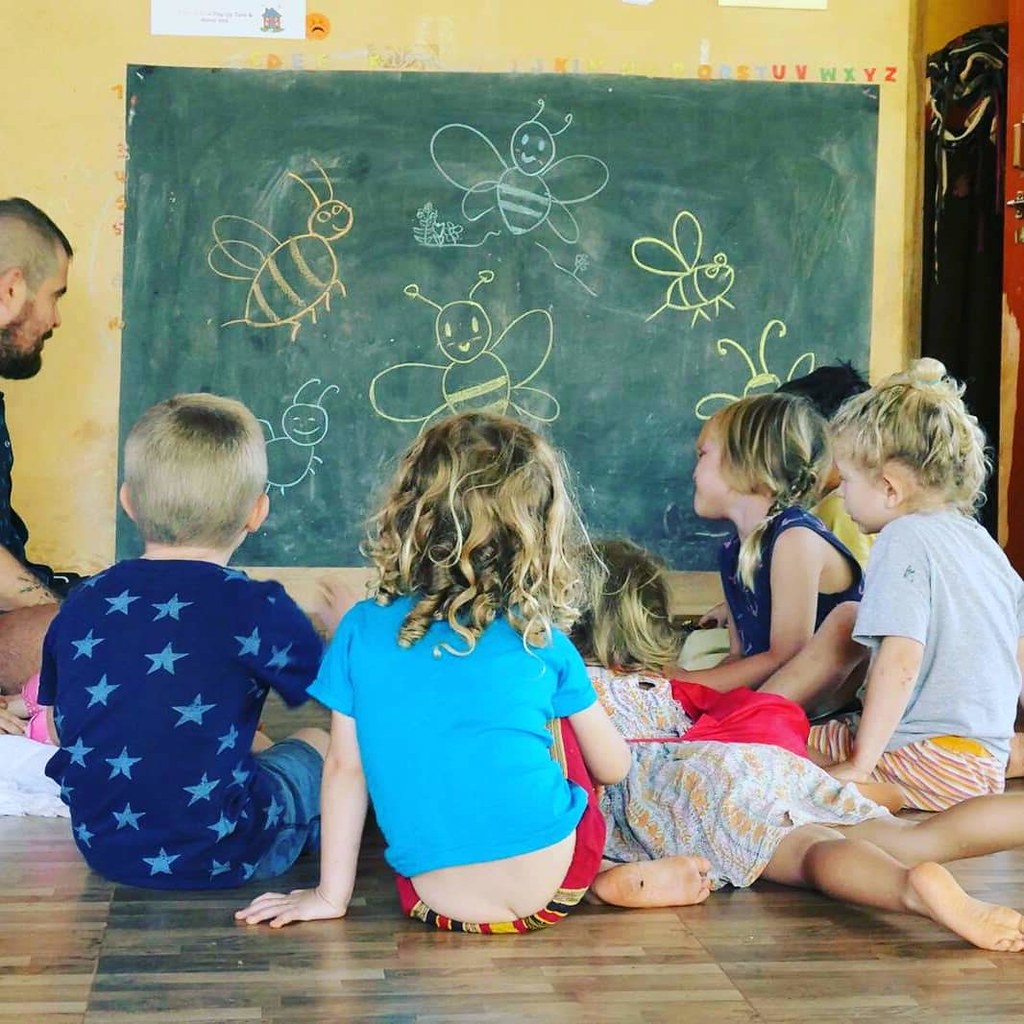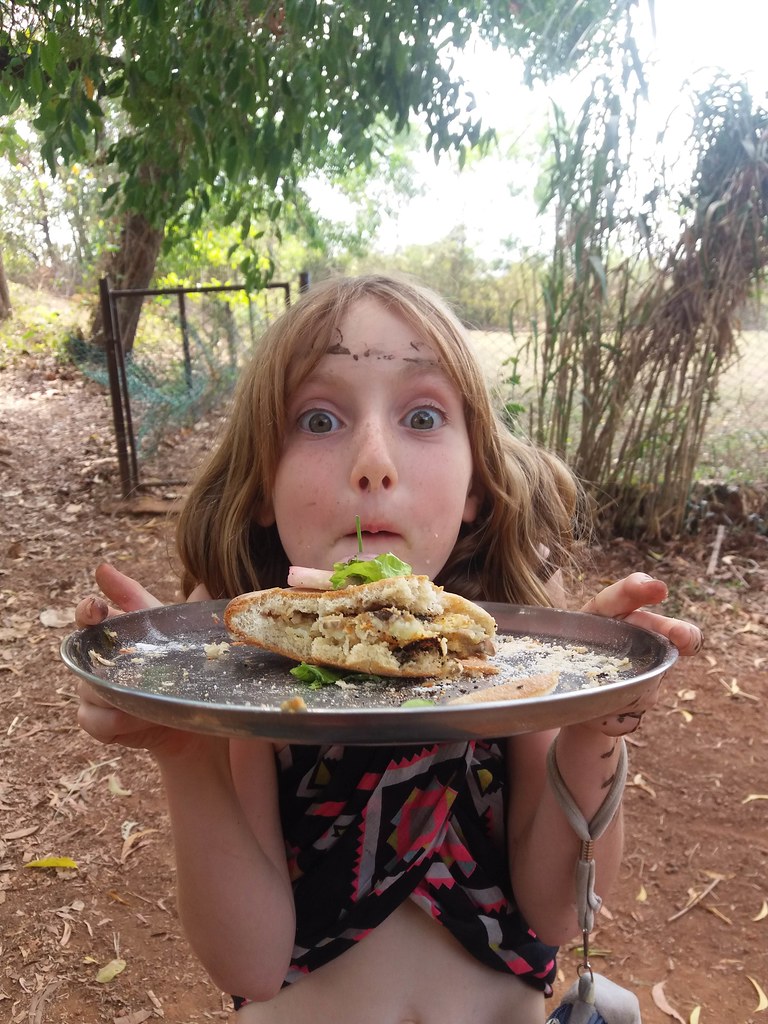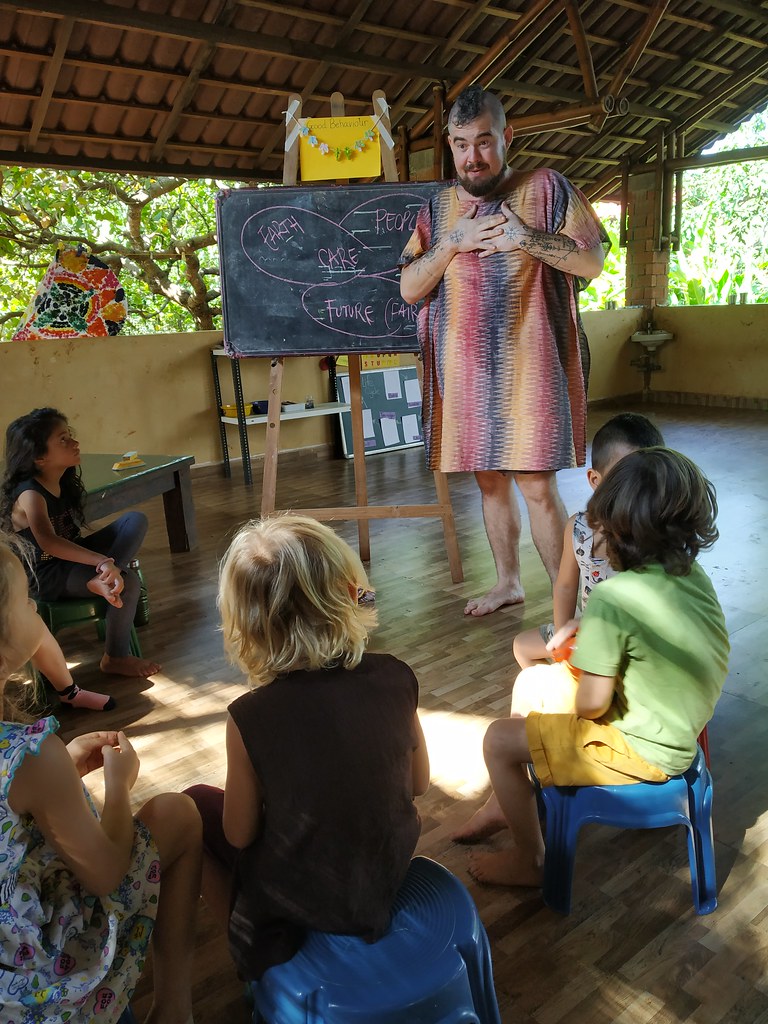 Over the last four years Claudiu Oprea has run experimental arts and alternative education projects with a permaculture focus in schools in London, Latvia, Hungary and Romania.
Over the last four years Claudiu Oprea has run experimental arts and alternative education projects with a permaculture focus in schools in London, Latvia, Hungary and Romania.
He told us about how Earth Care, People Care and Fair Share in Education: The Children in Permaculture Manual has influenced his work in India.
"The manual helped me form a skeletal curriculum structure I could adapt to the local context of teaching permaculture full time at an alternative education centre in Goa, India," he said.
"I was inspired to create and integrate permaculture workshops in line with the pedagogy and ethos of the school, which merges together Montessori, Steiner and the UK national curriculum for literacy and numeracy, as well as earth based learning and permaculture."
The school in Goa caters for children aged 3 to 12 years old who are mostly part of the expat community that lives seasonally in this part of India.
What did you particularly find inspiring about the manual?
"The whole manual is very useful and inspiring, with particular focus on curriculum, pedagogy, the eyes, hands and head, as well as the natural flow approach of sowing, growing and harvesting developed by colleagues at the Neohumanist Education Curriculum, AEN Romania. The activities in the book are also very useful tools for learning in the outdoor edible classroom I co-designed and build with the kids.
"Some of the activities expanded beyond the school and into our local beach community. One of the community's needs is to reduce plastic pollution in the ocean and the kids identified disposable plastic straws and bottles as the main culprits. As a school we looked at solutions around reusable water bottles and ethical straws; we even experimented with making our own straws from the many different kinds of bamboo and tough grasses grown on site to see which worked best.
"The kids made straws for their families and friends and tested their viability and durability before composting them. A campaign was launched and the kids, accompanied by teachers and some parents, went around their favourite beach spots and all the beach restaurants talking to the owners about replacing plastic with either homemade bamboo straws or recycled paper straws."
What's the favourite project you've done as a result of reading the book?
 "There are many examples, but I feel the most relevant, fun, thought provoking, creative and experimental was around the topic of food, inspired by the Mind the Food chapter.
"There are many examples, but I feel the most relevant, fun, thought provoking, creative and experimental was around the topic of food, inspired by the Mind the Food chapter.
"Growing food is such a simple way to demonstrate to kids the three core ethics of Earth Care, People Care and Fair Shares and get them involved in the whole process from planting, caring for plants, harvesting enough to meet our needs, cooking, preserving and sharing it as well as saving seed for next season.
"The workshop was carried out with all four classes during a whole month. We explored questions such as: Where does our food come from? Who grows it? What’s in it? How does it get from farm to plate? How do we honour the work that’s gone into producing it using creative cooking and preservation to extend its life and limit waste?
"We are growing quite a few edible and medicinal plants in our outdoor classroom and we are expanding the food growing areas onsite by a half a hectare in the coming season. Our aim is to serve more fresh food grown on site as part of the kids and staff lunches."
About Claudiu Oprea
 Claudiu is a Romanian born permaculture educator, artist, linguist and chef based in India and Europe. His deep reverence and connection to nature was inculcated by his herbalist grandmother who raised him as a free range child at the foot of the Bucegi Mountains in Romania.
Claudiu is a Romanian born permaculture educator, artist, linguist and chef based in India and Europe. His deep reverence and connection to nature was inculcated by his herbalist grandmother who raised him as a free range child at the foot of the Bucegi Mountains in Romania.
His teaching work and artistic practice are informed by natural systems; the forest is his teacher. The scope of his work involves reigniting the connection between humans with nature and the magical kingdoms of plants and fungi with a view to heal and regenerate degraded human ecosystems.
Claudiu's heart and current focus is in alternative education. In January 2018 he was invited to pilot an experimental outdoor edible classroom project following permaculture ethics and principles at Yogi Art Center, Goa (read more about this on Claudiu's blog). He set the foundations for an interactive and edible learning space with the kids as co-designers.
The outdoor edible classroom is a safe space where soil, highly nutritious plants, natural medicines and trees are nurtured and grown with the stewardship of the kids and the forest as their mentor. Now in its third season, Claudiu has just returned to India to continue the project.
You can get a copy of the manual on our website for £20 (members get a 10% discount).